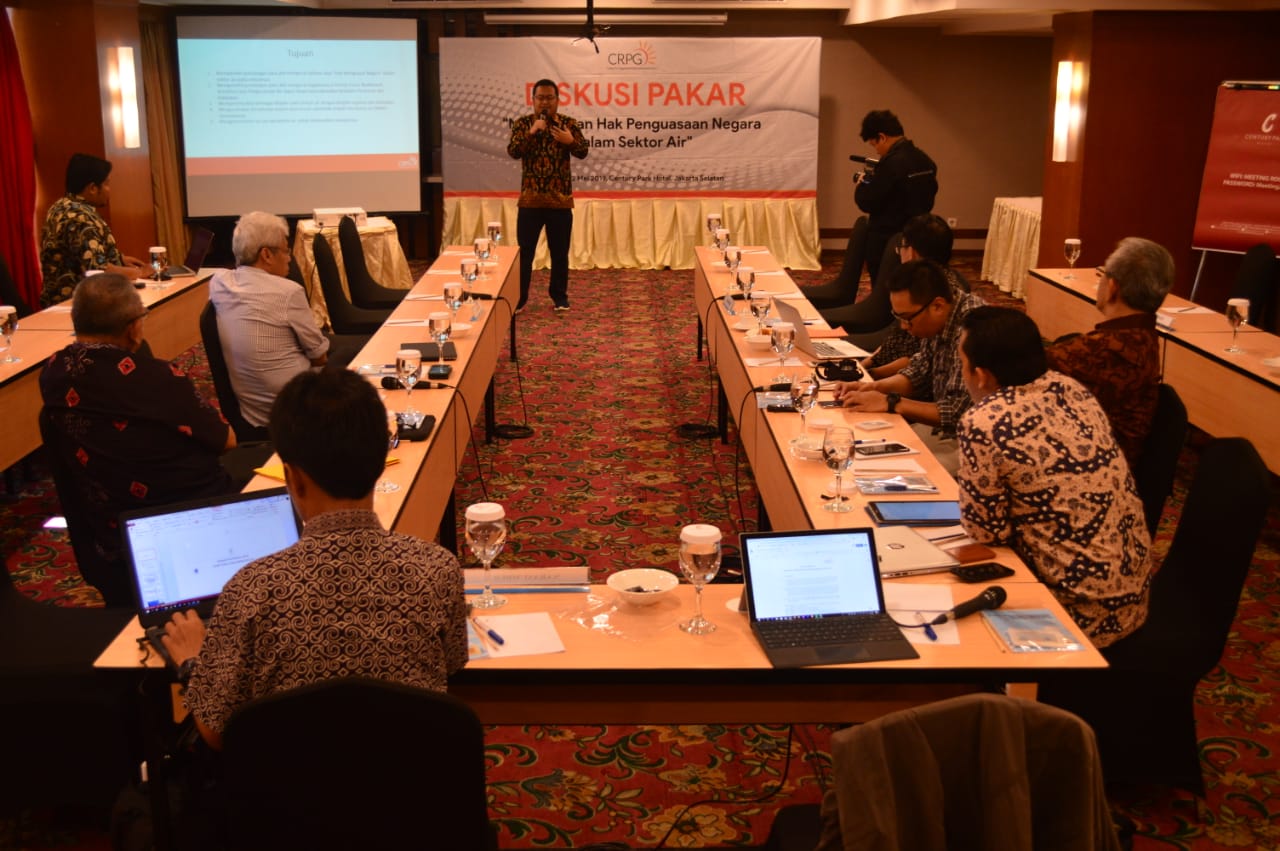The expert Discussion 2 on the "Interpreting State Control Rights in the water Sector in Indonesia" was held in Century Hotel in Jakarta – Indonesia on 2nd May 2019. Water experts from various disciplines agreed on the establishment of an inter and multidisciplinary Water Governance Expert Forum to safeguard the improve water governance in Indonesia. The experts also agreed that the fifth and sixth limitation for the exploitation of water from the Constitutional Court Decision which revoked the Water Resources Bill Number 7/ 2004 must still be studied critically, and examine the connection with the concept of State Control and Human Rights over Water.
The expert Discussion 2 on the "Interpreting State Control Rights in the water Sector In Indonesia" was a continuation of the previous discussion on the same issue on "the Role of Regulation for The Right to Water in Indonesia", and to follow up the successful development of a Multi-stakeholder Position Paper on the inclusion of community-based water and sanitation program in the new Water Law in Indonesia in order to get experts opinion on interpreting the state control rights on water.

Picture 1. Dr.Mohamad Mova Al'Afghani presented his introduction to the discussion
A number of water experts from various disciplines such as legal, limnology, hydrogeology, governance, and water management were presented to share their opinions and suggestions. Present among other experts panels were water law expert from Ibnu Khaldun University who also act as the Director of the Center for Regulation, Policy and Governance (CRPG) Dr.Mohamad Mova Al'Afghani, legal expert Mr. Ricardo Simarmata from Gajah Mada University, legal expert Mr. Amiruddin Ahmad Dajaan Imami from Padjajaran University, legal expert Mr. Benekdiktus Danang Se-tianto from Soegijapranata Catholic University Semarang, environ-mental researcher Mr. Gunawan Wibisono from Merdeka Malang University, civil society organization activist Mr. Nurkholis Hidayat from KONTRAS (The Commission for Missing Persons and Victims of Violence), limnology researcher Arianto Budi Santoso from LIPI (Indonesian Institute of Sciences), and Mr. Irwan Iskandar a hydro-geologist from Bandung Institute of Technology who also act as the Secretary General of PAAI (Association of Groundwater Expert of Indonesia). The GWP-SEA Regional Coordinator, Mr. Fany Weda-huditama was selected as moderator of the discussion.
In his presentation, Dr. Mova conveyed several interpretive issues on the 6 basic principles of the Constitutional Court (MK) Decision which were used as the basis for drafting the Water Resources Bill by DPR. Among the crucial issues regarded the definition of the private sector and business entity, the importance of emphasizing the ecological quality of water, and to what extent the "private sector/business entity" can be involved in drinking water and wastewater provision and services.
The legal expert Mr. Ricardo Simarmata argued that there are two sources to interpreting State Control Rights (Hak Menguasai Nega-ra - HMN) in Indonesia, namely Basic Agrarian Law number 5/ 1960 (UUPA) and several Constitutional Court decisions of which inter-preted the concept of “the signification that the land and waters and the natural wealth contained in it shall be controlled by the state and utilized for the optimal welfare of the people” shall be understood as a mandate which shall be executed by the state to make policy (beleid), arrangement (bestuursdaad), regulation (re-gelendaad), management (beheersdaad) and supervision (toezichthoudendaad).
The secretary general of Association of Groundwater Expert of Indonesia Mr. Irwan Iskandar argued that “water in all its forms should be regulated by a separate institution” (in one institution). Currently, the water resources and management in Indonesia is still being handled by several ministries for instance surface water by the Ministry of Public Works and Housing and groundwater by the Ministry of Energy and Mineral Resources. He added “water use in mining should also be included in the Water Resources re-gime".
Legal expert Unika Soegijapranata Semarang, Mr. Benekdiktus Danang Setianto, also noticed a lack of clarity in the Court Decision on the water right regime (as the owner) and right to water (the regulator). "It means that when the state wants to make a policy (beleid), it must be unambiguous when they want to enter the wa-ter right as its owner or actually wants to enter only as part of its regulator. In the first five MK principles, the collision of the two is not clear. A risk of chaotic situation regarding water resources might appeared, "he said.
Gajah Mada University legal expert Mr. Ricardo sees that until now the Court has not yet made a further explanation of the interpreta-tion on the six principles. There are also many interpretations that come out of academics through scientific writings. He was suspi-cious that the Court has issued the interpretation without knowing the characteristics of water.
All of the expert disagreed with the principles number 5 regarding the main priority is given to the State Owned Enterprises Local Government Owned Enterprises (BUMN/BUMD) has the main pri-ority to be granted with the exploitation of water. Mr. Ricardo questioned the state authority that had entered into private juris-diction through BUMN / BUMD. This supposed to be not happened as the private jurisdiction is not the scope of the Article 33 of the 1945 Constitution of the Republic of Indonesia. Mr. Mova also have questioned the ability of BUMN / BUMD to be given such re-sponsibility to manage water resources. Mr. Irwan Iskandar argued that the state must take responsibility for the availability of water in the community this mean “if they are is not capable, the state should appoint the private sector to manage it”. Furthermore, Pad-jadjaran University legal expert Mr. Amiruddin Ahmad Dajaan Imami said the use of “BUMN / BUMD priority” were very disrup-tive. AW